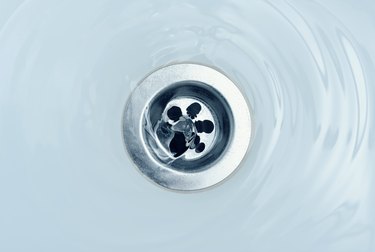
In This Article
Homeowners aren't just in charge of a mortgage — it's also their responsibility to keep the utility systems in their house working properly. Most utilities are straightforward, but for houses with septic systems, some additional attention may be needed. The septic system manages all of the wastewater streams from the house, like the bathroom, kitchen, laundry and basement, and it gathers it in a holding basin called the septic tank. In the septic tank, waste material is broken down, and what exits the tank is then neutralized and made harmless.
What's Rid-X?
Video of the Day
Rid-X is the brand name of a package of bacteria and enzymes meant to help break down household waste in a homeowner's septic system. While most septic tanks will already have working enzymes and bacteria inside them, Rid-X works as a supplement to refresh the system and help clean out any buildup from years of use. The microbial package in Rid-X is harmless to humans, pets and nature — although direct consumption or application of the product isn't recommended.
Video of the Day
The bacteria and enzymes in Rid-X focus on breaking down food and bodily wastes, attacking oils, fats, proteins and starches, but Rid-X also contains enzymes that specifically attack paper products so that toilet paper, paper towels and other similar items are broken down as well. This prevents the buildup of solid waste inside the tank.
The Truth About Rid-X
According to Rid-X, this product can be used in all sorts of drains, from the kitchen sink to the toilet. All of these will stream right into the septic tank where it can begin its work. While Rid-X for pipes won't get rid of a perpetually clogged toilet or plugs that are already there, it will help clear waste buildup in the lines to keep everything flowing smoothly. If you use it regularly, rotate the entry point so that each set of pipes sees the product periodically.
Rid-X and Sewers
If your home goes to a city sewer system, there's no need to use Rid-X. The city manages the storage and treatment of household wastewater in that case. While technically Rid-X may help the plumbing in your house over time, it could also interfere with the city's water management, so it's best to avoid it.
Check your utilities — if you have a charge for city sewer or water management, you don't have to worry about a septic tank at the moment. If you have pipes that could hold water (with potential buildup) for long periods, a Rid-X flush could be appropriate, but the product requires time to work.
Proper Septic Tank Care
Keep in mind that even using a supplemental product like Rid-X regularly, a septic tank still needs to be pumped out every two to three years. This keeps residual waste from building up in the tank and potentially blocking the water outlet, which can lead to clogging and damage. Rid-X can help extend the life of the system between pumpouts, but it won't eliminate the need for pumpout maintenance entirely.
Plugged Plumbing and Rid-X
Rid-X will also do nothing for a plugged toilet, sink or shower. In those cases, if a plunger doesn't work to press the clog through the system, there are a few options. Products like Drano or Liquid-Plumr can help to dissolve organic buildup in drains but can also damage piping due to their acidic nature and should be used sparingly if at all.
Plumbers often use tools called snakes or wires to push at line clogs until they break up. Once the line is clear, periodic use of Rid-X in the pipes can help future buildup from occurring.
How to Dispose of Rid-X
To properly and safely dispose of Rid-X, you should mix it with sand or cat litter and tightly close the container that it is in. The sand or litter should soak up the liquid, making it less dangerous. Then, place the container into a bag and tie it shut tightly. Throw the bag into the garbage.
Some hardware stores will also collect chemicals for disposal if you are uncomfortable throwing yours away or if you do not have trash collection at home. Contact your local hardware store for more information.